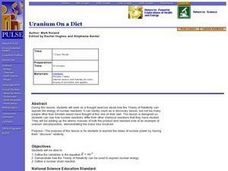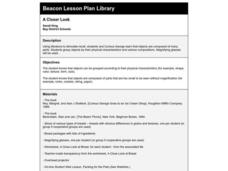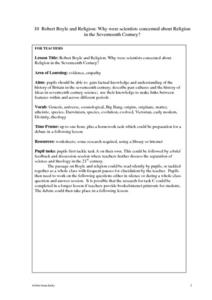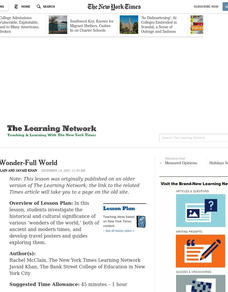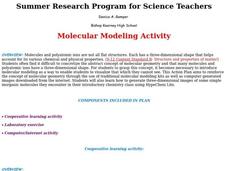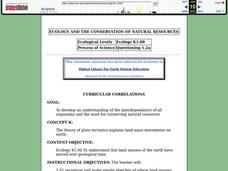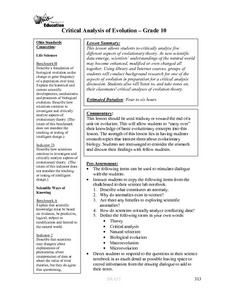Curated OER
Uranium On a Diet
Students examine how nuclear reactions differ from other chemical reactions they have studied. They add up atomic masses of both the product and reactant side of an example of uranium decomposition, demonstrating mass loss involved.
Curated OER
Plate Tectonics Review
In this plate tectonics instructional activity, students review concepts such as the types of plate boundaries, the concept of continental drift, sea-floor spreading, earthquakes, and plate tectonics. They match 30 terms with their...
Curated OER
A CLOSER LOOK
Students group objects by their physical characteristics and various compositions using literature to stimulate recall.
Curated OER
Robert Boyle and Religion
Learners discuss past cultures and the history of ideas in seventeenth century science. They answer a list of questions and prepare for a debate on the subjects of science and religion and views on how the universe was created.
Curated OER
Nosferatu Expression and Diminished Chords
Learners explore how to construct and play diminished triads and half and whole diminished chords on the keyboard. They create appropriate sounds to accompany sections of the movie "Nosferatu: A Symphony of Horrors." Students discuss the...
Curated OER
The Element of Color
Eighth graders study and analyze the elements of color by creating an personalized color wheel. Emphasis is placed on constructive criticism of student work by others for assessment. Students create short poems for their color wheel...
Curated OER
THE MANY COLORS OF SUNLIGHT
Students examine rainbow components, spectral colors, colors perceived by the eye, hot solids, glowing rarefied gas, absorption, that light is a wave, and optics.
Curated OER
Calculating the shortest distance between two points
Eighth graders find the length of the third side of a right triangle.
Curated OER
Fossils and Natural Selection
In this fossils and natural selection worksheet, students will read a cause related to fossils and natural selection. Students will write in the effect of each of these causes. This worksheet has two questions.
Curated OER
How Do I know That a Book Is Just Right for Me to Read?
Students choose a book for reading. In this language arts instructional activity, students take steps to evaluate a book for free reading. Students make a list of words found in the book that they are unfamiliar with.
Curated OER
What a Wonder-Full World
Students investigate the historical and cultural significance of various 'wonders of the world,' both of ancient and modern times, and develop travel posters and guides exploring them.
Curated OER
Art and the Berlin Wall
Students study the relationship between Cold War politics, the people who were affected by it, and the artists who examined it. They create their own "walls" using a spray paint graffiti procedure.
Curated OER
Vocabulary - Atomic Structure
In this atomic structure activity, students use textbooks and dictionaries to find the definitions of 22 terms associated with atomic structure.
Curated OER
Cell Theory, Plant And Animal Cell Comparison
Tenth graders study plant and animal cells. In this investigative lesson students draw their own animal cells and label them.
Curated OER
Developing a Theory About the Nature of the Contents of a Sealed Box
Students observe the changes of a closed chemical system. They record and analyze the data as they manipulate the system. They answer questions to end the lesson.
Curated OER
Symmetry: Theory, Reality and Art!
Pupils explore the concept of geometric symmetry. In this geometric symmetry lesson, students walk around their school and take pictures of objects that demonstrate symmetry. Pupils use Microsoft Paint to draw the lines of symmetry on...
Curated OER
Free Market Labor vs. Slave Labor Debating the "Mud-Sill" Theory
Students read the speeches of Abraham Lincoln and James Hammond. They discuss the speeches and answer questions about free labor vs. slave labor.
Curated OER
Introduction to Biology
Students study cell theory and the link between it and technology. In this cell theory instructional activity students examine the importance of cell theory.
Curated OER
Death at Jamestown
Young scholars use primary source documents to develop a theory about what happened at Jamestown. They use the internet to gather information about the colony. They evaluate the theory of Dr. Hancock as well.
Curated OER
Molecular Modeling Activity
High schoolers work together to explain the VSEPR theory and how it relates to molecules. They name electron pairs that can surround the central atom of an organism. They discuss the factors that determine the polarity of a molecule as...
Curated OER
Colonial America
Eleventh graders study the Salem Witch Trials and the different theories for the hysteria. In this American History channel, 11th graders explore primary source documents to understand the stories of various people involved in the...
Curated OER
Ecology And the Conservation of Natural Resources
Students study Alfred Wegener's theory of continental drift and how the continents were connected in one large land mass called Pangaea. They examine plate tectonics and the theory that the earth's surface is composed of large moving...
Curated OER
Critical Analysis of Evolution
Tenth graders discuss anomalies in nature and science. They discuss times that anomalies led to the collection of data that explained the phenomena and contributed to changing scientific understandings. Students work in groups to...
Curated OER
Multiple Intelligences
Students investigate Gardner's theory of multiple intelligences. In this research based lesson, students compare theories of intelligences and examine the implications of using these theories in schools and society.
Other popular searches
- Math Number Theory
- Number Theory and Operations
- Number Theory 1
- Number Theory Rounding
- Number Theory Ed Helper
- Number Theory Ii
- Number Theory Edhelper
- Number Theory Concepts
- Number Theory Lesson Plans
- Math + Number Theory
- Egypt Math Number Theory
- Color Tiles Number Theory


